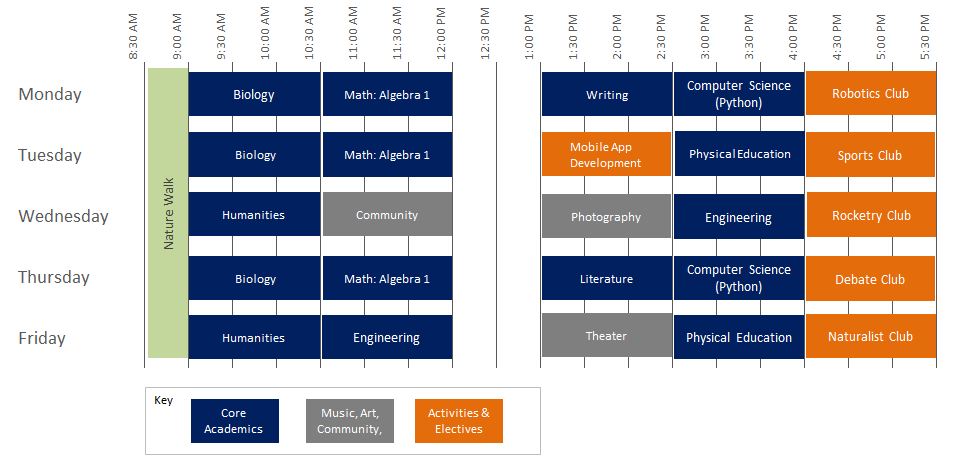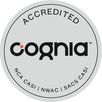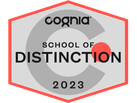IDEAVENTIONS ACADEMY
Middle School (6th-8th)
Creating awesome experiences since 2015
Offering an exceptional education for gifted children in grades 6th - 8th grade, our middle school curriculum is designed for the intellectually curious who desire a challenge and are excited by deep questions and advanced hands-on STEM coursework. Through supportive and expert teachers, advanced coursework and a warm and comfortable environment, the curriculum shapes and prepares them for the depth and challenge of our high school.
Classes are block schedule and delivered in 85-minute sessions.
Classes are block schedule and delivered in 85-minute sessions.
Mathematics
|
Core Curriculum
|
High-School Level Math Classes
Problem Solving and Competition Math: We believe that problem solving can be practiced and learned. We also recognize that it takes time and difficult math problems in order to be able to work through them. Our 6th - 8th grade students learn problem solving skills and put them to practice with the Math Olympiads, AMC 8, and MATHCOUNTS competitions. |
English & Language Arts
|
Reading: Students think critically about what they are reading so that they can begin to understand what makes these narratives work and why they are still beloved today. Just as a scientist supports his or her conclusions with observations, so too must our students cite specific passages in the novels as they learn the art of literary critique.
|
Writing and Communications: We focus on the study of the fundamentals of grammar, sentences, and paragraphs. In order to write effectively, students must understand that good paragraphs contain correct sentences. To start, we will focus on all the elements that make correct sentences, including the proper use of the parts of speech, phrases, and clauses.
|
Science
|
6th Grade: Honors Biology
Welcome to the fascinating world of biology! This laboratory-based course makes biology come alive through hands-on activities, guided inquiry, and student-led research projects. Students will study life at both the macroscopic and microscopic levels, focusing on human and plant biology. This course is divided into five units: natural selection, human body, plant systems, cellular biology, and genetics. Each week features short lectures, hands-on activities, and labs providing students with practical experience in laboratory techniques and safety. During the plant biology unit, students complete a major research project that focuses on a plant biology question of their choice. Goals of the course include learning laboratory skills, practicing scientific communication, and developing critical reading. Students learn a variety of laboratory techniques including dissection, basic microscopy, and genetic engineering. To develop their communication skills, students report their experimental findings by writing short scientific papers and delivering oral and poster presentations. They also evaluate current news articles highlighting scientific advances, learn to analyze data from scientific publications, and discuss Gut: The Inside Story of Our Body’s Most Underrated Organ. |
7th Grade: Honors Chemistry
Explore how chemistry plays a role in the world around you! Chemistry is a full-year, project-based course covering fundamental chemistry concepts. Students will learn about the structure and properties of matter, atomic structure, chemical reactions, and interactions between energy and matter. Each class will feature a short discussion followed by hands-on investigation, providing students with practical insight into the nature of scientific inquiry. Students will use their chemistry knowledge to complete challenging projects throughout the year, then put it all together to create a chemical Rube Goldberg machine! Goals of the course also include learning laboratory safety, improving critical reading, and developing scientific communication. Students will establish laboratory safety guidelines to follow throughout the year and will experiment with a variety of laboratory techniques. To develop critical reading and thinking, students participate in a chemistry book club. Students evaluate current chemistry news and discuss The Martian, a New York Times bestseller by Andy Weir. To develop their scientific communication skills, students present their projects in a variety of formats. The ability to effectively communicate your research and the importance of your findings is key to scientific success. |
8th Grade: Algebra-Based Honors Physics
Physics provides a foundation to make sense of the material world for everything from galaxies to sub-atomic particles. Our curriculum is based on providing engaging, hands-on experiences that excite students about exploring the physical world, asking questions, and seeking answers. The course is designed to use a combination of reading, discussion, hands-on labs and investigations, problem sets, and real-world projects that facilitate meaningful learning. Students will study a range of topics in physics including motion, energy, work, momentum, sound, light, electromagnetism, and the structure of the atom. Goals of the course include learning laboratory skills, practicing scientific communication, and developing critical reading. Students will learn a variety of laboratory techniques, including measurement, data analysis, and keeping lab notebooks. To develop their communication skills, students participate in discussions and deliver oral presentations. Students also participate in a quarterly book club to improve their critical reading skills and read You Have No Idea. |
history & social studies
The Middle School history and social studies courses focus on developing the skills needed to read, think, and interpret like an historian! Students hone their sourcing, contextualizing, corroborating, and close reading skills by touching on a variety of moments in history starting with ancient history and chronologically working their way toward medieval times, ending with modern times, focusing on both times of war and peace. Each week, students seek to answer a central historical question through reading and analyzing a variety of primary and secondary sources, all the while looking at multiple perspectives of a given situation; they also watch a variety of videos to help create visual connections. Heavy emphasis is put on evaluating sources for bias and trustworthiness, as well as using evidence to support an argument. Writing tasks range from opinion pieces to analytical pieces, to creative pieces, among others. Both individual and class projects are developed, which ask students to apply knowledge from class to form an assortment of work products.
- Year 1: Honors World History
- Year 2: Honors U.S. History Part 2
- Year 3: Honors Civics and Government
engineering
Take a brief look around the room that you are currently in and note of some objects that are lying around. Whether it is a complex device, like a laptop, or a simple object, like a pencil, nearly every item in your room has been designed by someone using the engineering design process (understand the problem, brainstorm, design, create, test, modify). The focus of the class is to learn about this process and understand how it plays a fundamental role in the development of our world. Every day, engineers are devising solutions to problems and creating new technologies that help society thrive. The students of this class will be participating in this progress by strapping on their thinking caps and becoming problem-solvers!
- Engineering Foundations: Students are introduced to the foundations of engineering including prototyping, cost estimating, and engineering drawings. Students then practice what they learn in a large project where they design organizers for the school. Students then work on two smaller projects: Rocket Propulsion [Mechanical, Chemical Engineering] and Cardboard Chair/Stool Challenge [Structural Engineering]. The large project integrates engineering and science lessons from the Engineering the Future high-school level curriculum.
- Engineering Explorations: The course is composed of two large projects (putt-putt boat, underwater ROV) and one smaller project (rocket cars). One of the large projects integrates engineering and science lessons from the Engineering the Future high-school level curriculum.
- Engineering Creations: The course begins by exposing students to one of these innovative technologies that many professional engineers use on a day-to-day: Computer-Aided Design (CAD). CAD has allowed users to more easily explore design ideas, visualize concepts, and simulate how a design will perform in the real world. It opens a window to increased productivity, improved quality of design, and better communication. For the first part of the year, students learn how to use the 3D design software, Autodesk, to create their own designs and then test how they perform in simulations. This is a powerful skill for any engineer to possess. The students then dive into the science behind acoustics and electronics by designing and constructing their own electric guitars from scratch using a Computer Numerical Control (CNC) machine. Students learn how these devices work and the underlying principles that influence their performance. Along the way, they strengthen their teamwork and project management skills, and learn how to safely use a variety of workshop tools and techniques.
computer science
Based on the K-12 Computer Science Standards from the Computer Science Teachers Association, our curriculum focuses on computing topics and skills, not programming languages. Programming languages and the technology industry are perpetually changing, however, with the proper computing skills and knowledge, students will have the tools to adapt to new technologies with ease. Our curriculum aims to teach the art and science of problem solving using computational thinking as well as the principles and practices of computer science. Our goal is for students to practice computational problem solving from mathematical, scientific and engineering perspectives through hands-on, rigorous and engaging activities where they learn and master how to solve a variety of challenges using computing technologies. Topics of study include:
- Year 1: Foundations of Computer Science; Python with Micro:bit; Invention Convention; Introduction to Data Science; Robotics - LEGO EV3 with MicroPython
- Year 2: Computational Thinking & Impacts of Computing, Networking, Cybersecurity, and the Internet; Fundamentals of Python; Python Applications: Intro to Machine Learning; Software Development - Tech in Education; Game Development with Python
- Year 3: Computational Thinking & Cybersecurity; Data Structures and Object-Oriented Programming; Python Applications: Libraries & Data; Physical Computing: Voice-Controlled Assistant
community & social/emotional learning
In “You and Your Community,” students learn about being productive members of their immediate and extended communities. The curriculum will focus on goals developed in accordance with the ASCA Student Standards, CASEL Social Emotional Learning Framework, and Standards for School Counseling Programs in Virginia Public Schools. In this class we focus on three domains: academic, personal/social, and career.
- Academic: Note taking, organization, test taking, classroom skills, other executive functioning skills, healthy habits for academic success
- Personal/Social: Growth mindset & goal setting, emotion management, recognizing bullying and harassment, managing relationships and social conflict, digital citizenship, character education
- Career: Career exploration and career preparation
physical education
Physical Education is a time for students to learn to enjoy being physically active. Through activities that appeal to the individual student and activities that can be sustained throughout their entire lives, students enjoy getting exercise and getting their bodies moving. There are two components to our PE curriculum:
- The daily nature walks, which can be walking or running, embodies a type of exercise that can be enjoyed for a lifetime.
- We partner with the Reston YMCA for the facilities and to deliver the physical education instruction.
spanish (Elective)
Middle school students can take introductory-level courses in Spanish. These fun and immersive classes use games and play to learn skills in listening, speaking, writing, and reading.
Students also have the option of taking HS Spanish I.
Students also have the option of taking HS Spanish I.
fine & performing arts (Elective)
In the visual arts on the importance of the creative process. Students explore the restrictions and freedoms of art projects and challenged to grow in awareness, relationships and expression with an emphasis to be real, be themselves, and discover the joy of the creative process. Students will learn that balance and unity are dependent on relationships and order.
In performing arts, students have the opportunity to learn improv, theater, harp, woodwind instruments, and acapella to learn skills, gain confidence, and have fun in a creative and supportive environment.
In performing arts, students have the opportunity to learn improv, theater, harp, woodwind instruments, and acapella to learn skills, gain confidence, and have fun in a creative and supportive environment.
experiential learning
Part of our teaching philosophy is that we should have regular experiential learning experiences. These experiences can range from seeing a play on a topic we’re studying, to digging for fossils or visiting an historical location. Students should have an opportunity to get out of the classroom and see our community. We believe students should be able to take what they have learned in the classroom and experience it in real life.
Sample 4th - 8th Grade ScheduleIdeaventions Academy students are involved in a variety of activities and interests. This is a typical week for a 7th grader at Ideaventions Academy. With a passion for engineering and art, she is involved in a variety of club activities, including robotics, music and rocketry.
|
Copyright © 2010-2024| 12340 Pinecrest Road, Reston, Virginia 20191 | 703-860-0211 | [email protected] | Tax ID 27-2420631 | CEEB Code 470033





